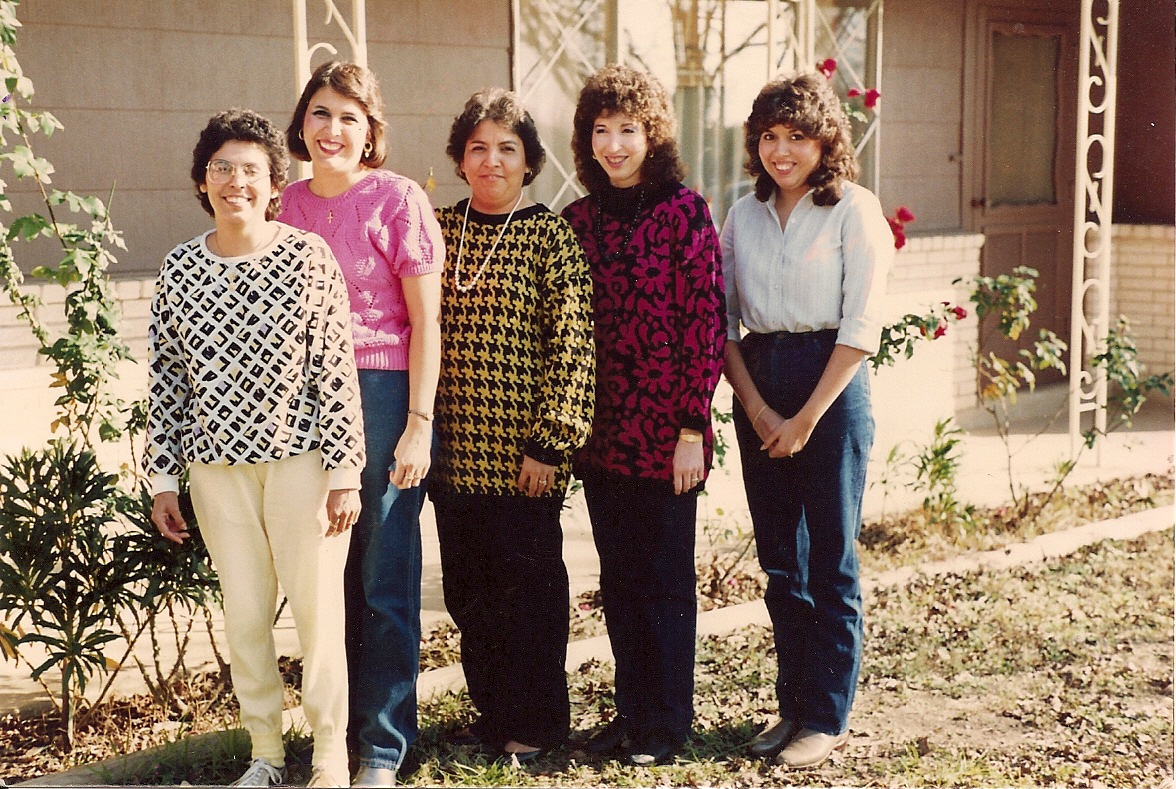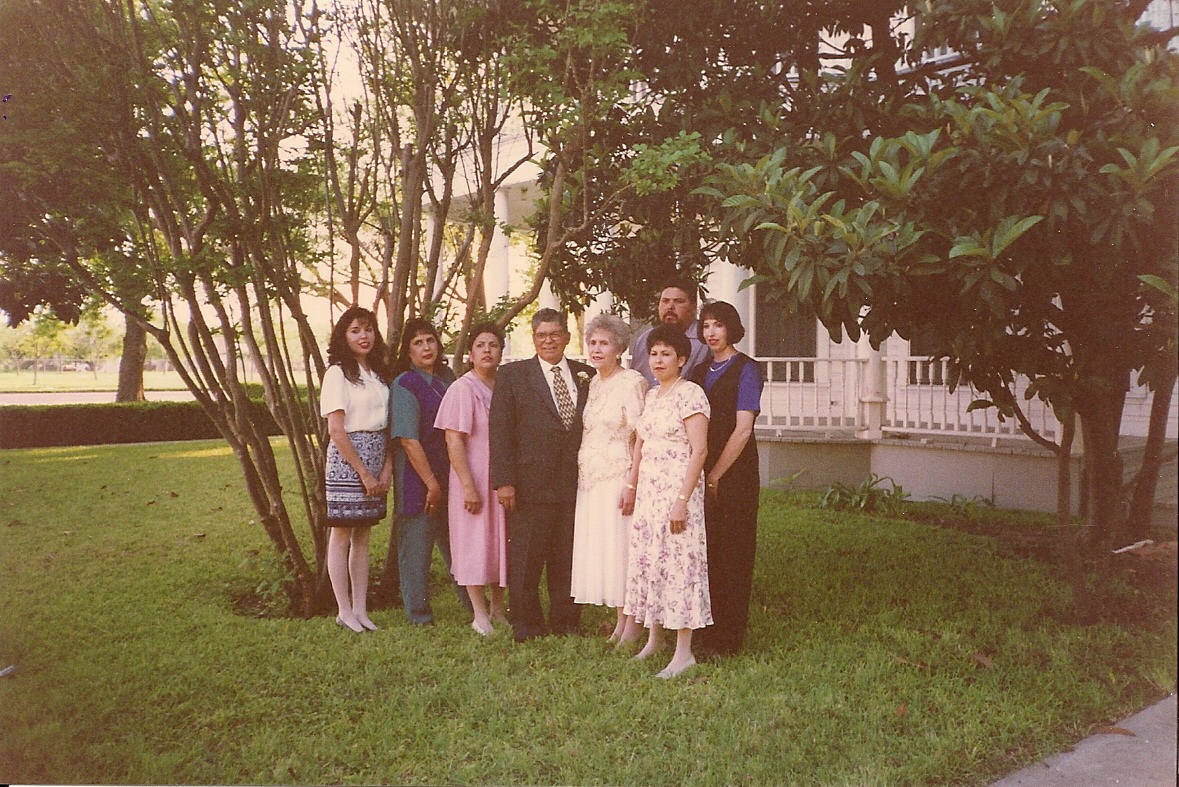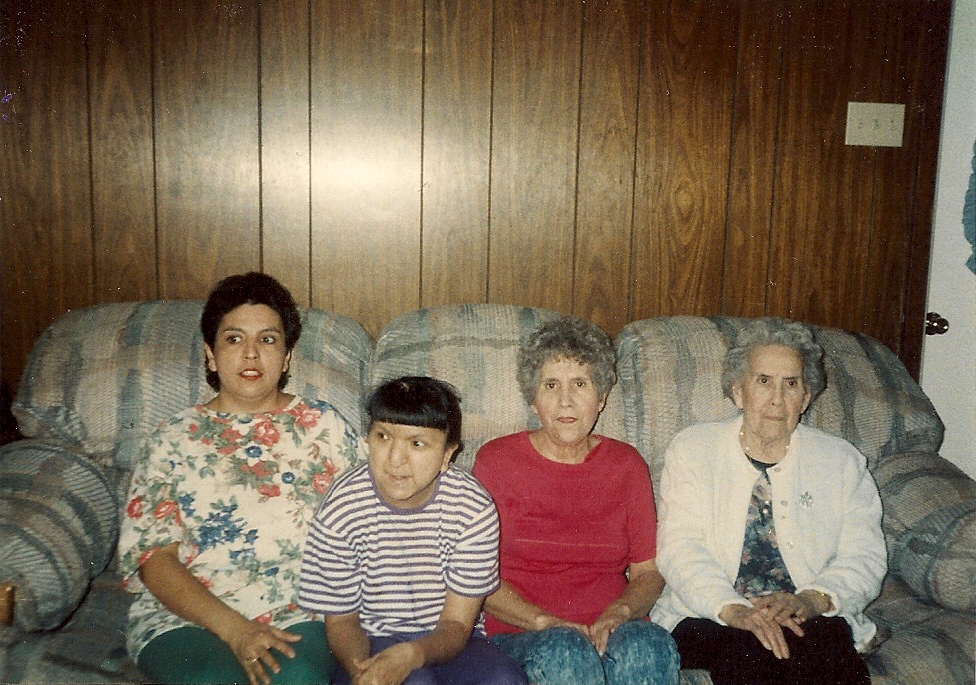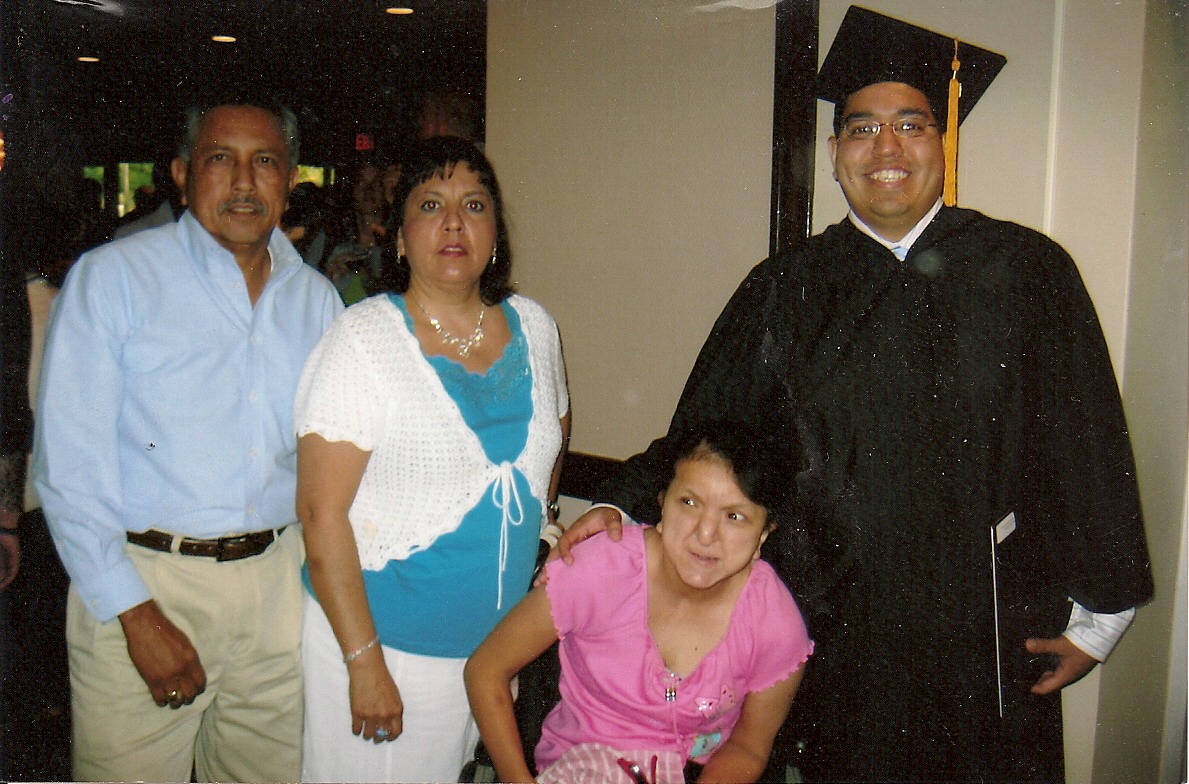TRANSCRIPTION
What are your earliest childhood memories?
When we were in school, I used to play, a lot of times, I used to play with the boys and they had a little black puppy and that puppy was one of my first pets. It was black and I named it Blacky, he was a fluffy little thing and think that was one of my first memories because my mom didn't like animals. That was my little thing, leave my puppy alone, that's my puppy. I was really happy 'cause I had that. I think I was in first or second grade.
What was it like going on in your household?
Growing up in my household was...six kids in a small two bedroom...Very restricted, we didn't have extras or anything. It was just making food for us, 'cause there were a lot of us. But we were very happy, we were always church going people. Every Sunday, we always went to church together. We did things with the family, we always sat down and had meals together, we hardly never didn't have meals togther. It was always, you know, we sat down to have meals together. Of course, us girls always took turns washing dishes afterwards. (laughs) But that was a normal day. Our neighborhood was..I mean, when we would play baseball, it was all the neighborhood kids all the time. We had fun, whether you were a boy or girl, we all played togther as a team. We played out in the street, you know it was you be on this team, we'll be on this team, it was divided. We had fun. It was very simple, no, nothing electrical, we had a t.v. and my dad had control of it. So when we wanted to watch t.v, well,a lot of the times we spent our time outside. When we came home from school it was homework and then dinner and then by the time we all bathed, you know it was all of us with just one bathroom. It was hard. But that was very simple life, nothing like now.
What do you wish was still the same about today?
Just being a family, you know, having meals together. We don't have meals togther. Now we have working families and everything. Mom never worked, so we always had meals togther. That's what I wish, meals together and to go to church together, which we hardly ever do, you know, because of our work hours.

Were your schools segregated?
No. I went to catholic school, i grew up, from the first grade through sixth grade, I went to catholic school. In the church part, the hispanics always sat on one side and the whites sat on the other side in church. That's the way is was. Well, you know the whites didn't like the hispanics, and it's funny those that didn't like hispanics ended up with hispanics.(laughs) But that's what it was like in church and hispanics don't look at the white side 'cause that's the white side. And it was kind of bad, because it was church.
What was the population like in Devine?
Like one thousand, five hundred.Just whites and hispanics. Every body knew everybody and they were all related. Live if I go to Devine, everybody's realted to me. It was always family oriented. That's the wasy that little town was. Now, it's changed so much, I don't even know half the people there, 'cause it's grown, you know, generations have gone. There were no blacks.
What did you brother do while you and your sisters split the chores? What did you think about your brother not having to do chores?
Nothing, he was spoiled. We were used to it and knew things would not change since he was the only boy. Up to right now, he's still spoiled.
How did you split the chores, everyday, every week?
Each day one girl would clean and wash the dishes. Monday one would do, Tuesday one would do..and, you know, we'd start over again. The oldest one would give us money because she didn't want to do her day. You know, back then fifty cents was a lot of money. Give me fifty cents and I'll do what you want. So, she would give us money. Mom was okay with that, so long as the chores were done.


What was discipline like?
Dicipline was very disciplined. If you did something wrong, you were punished. In church, you didn't turn back to see who was coming in 'cause they'd pinch you or give you bad, you get the eye level from my mom, you knew you were in trouble. And they would hit us with a belt. There was no, like, child abuse, like now. And you were afraid, never disrespected your family, especially the elderly. Yes Maam, No Maam. You were spanked if you were wrong or whatever. And my mom and dad were very strict with us. They didn't let us go any place, and if we did, we had to be home at a certain time. I'm talking the weekdays ten and the weekends eleven IF they even let us go. If you went out one weekend, you probably were not going out the next weekend. You weren't going to be going out all the time. We were brought up very strict. If we went out on a date, we all had to go together, you couldn't go by yourself. We were brought up very strict, that's all I can say, very strict.
How long did you know Roy before you got married and how did you meet?
I met Roy, my dad had a family business, so I met him there. He would go in as a customer and that's where I met him there and it was a long time, he would call me on the phone, but it was a long time beore he could come over to the house. I had to ask permission. He could come over and they had to meet him and even at that when we would go out one of my sisters would come. It was that strict. (laughs) No, hey, Mom, I'm goin'
How old were you when you started dating?
I was almost seventeen. And even at that my mother didn't belive in us. Even the dating was, he could come to the house and sit at one end of the room and he sits on the other. It was supervised. We would watch t.v. By then we had an extra t.v. But, I was seventeen, it was two or three years before we got married him It was always supervised and had to go out with my sisters to go on a date. (laughs)

Who did the cooking in your house?
My mom. She did all the cooking, but we had to clean up. She did all the cooking and chores about washing, she would wash and we had to bring in all the clothes and put it up. She would was because it was a wringer type thing, there was no automatic washer and dryer. I remember my sister put her arm in the little rolls back then and she was crying. We had a baby goat so we had to take turns feeding it.


What is one thing your mother taught you that you still carry with you today?
I think mostly, cleanliness. She always taught us to be clean with our bodies and clothing. She taught us to teach our kids respect. She taught us that you can be poor, but you can be clean. You don't have to be dirty id you 're poor. She used to cook fideo, potatoes and tortillas. I take that with me, because I like that. (laughs) But then it was a lot of that.
What's one thing you wish parents taught kids these days?
I think they should teach them a little more respect and discipline when they do something, not by hitting them, but sitting down and explaining to them what respect is all about. Why you have to do what you have to do. Teach them essentials like, hey let's do this today. You know, if they were to be out on their own they gotta go laundry, and you gotta cook, you know, just everyday chores. And it should start early, because my mother always. I think we were in the fifth or sixth grade and we were doing dishes already. Respect, most of all, that's the main thing. Also a lot of kids think that the elderly are not… That's one of my pet peves, I want my kids to be close to their grandparents. I was very close to my grandmother and when she passed I missed a lot of years. She taught us a lot, she did a lot with us. If you have grandparents you should never forget what you did with them, that's for sure. Kids need to respect the elderly and hang with the elderly. Just because you're young, doesn't mean you can't hang with them. They need love and attention too. That's one of the things that is important when bringing up your children.
What kind of toys did you play with when you were young?
The toys we used to play with were dolls. We had dolls and dishes. That was it, we didn't have…And maybe we would play with my mom's high hills. We would dress up. That was the only thing that we played with, we didn't get anything else. There were no luxuries; we all just had little dolls. My grandmother made little baby dressed for them. We kinda learned and would sew some. Those are the only things I remember.

How old were you when you got your first car?
I was out of high school. I had just graduated and I had a 1962 Chevy Bel Air. That was my first car. I was already out of school, but I had to pay for it. I was already working, so that's how I paid for it. I earned my car, my dad didn't give it to me. I bought it and would give payments on it. I remember that so well, how I wanted a car all the time and they never gave us cars back then like they do now.
How old were you when you started your first job?
I was 18 and worked at the Devine nursing home. It's an assisted living place. It went from a nursing home to an assisted living place now. Back then it was like seventy five cents an hour. I worked from six o'clock to two o'clock in the afternoon.
Did you ever have any difficulties in the workplace reguarding harrasment, discrimination or just trouble finding a job?
No, never. I actually had fun at that job because two of my aunts worked there. It was neat working with them and they taught me how to handle patients and patient care. I learned how to shave men. We used to bathe them and then shave them. It was fun, I really, really enjoyed working there. That was one of my first jobs and I thought I wanted to go into nursing, but I didn't. When I went there for orientation a patient died. That's sad. We had to tell the family and bring in all their stuff, and actually, we had to bathe them before they were picked up because they wanted them clean.
How, in your lifetime has women's roles changed?
The change is the washer and dryer, and the pampers. The children used to use cloth diapers. There are dishwashers now. We used to hang out a lot of clothes and now people just throw it in the dryer. I mean we used to hang a lot of clothes because there were six of us. The lines were long. Back then everything was homemade and now we have it made. We can go to the store and buy stuff, back then we didn't have money to go to restaurants and eat out. You cooked everything, you never ate out. Also back then, women didn't used to work like women today. Back then the men took control and the women stepped back. Now, it's the other way around. That's one of the biggest things.

What types of medical incentives are there now that your kids didn't have?
Now, if they were to have Cranial Sysnosis like Julie, they don't have to cut your head open from ear to ear and back to back. They would do it endoscopally through a little hole. Back then it was a hard surgery. The technology now is so modern. Just like seziures, there are all types of medicines that are up to date. Back then they didn't have any. And therapy is great now. If they would have had it when Julie was able to do more of getting around, like after her leg surgery, they didn't offer therapy then like what is done right after now. The pediatrician didn't really look for things that could be wrong, now there all up to date and modern on everything. I think if my pediatrician would have told me at an earlier age instead of eighteen months that maybe we could have saved something of Julie's, like talk or walk. But they didn't, it was eighteen months before she got help. It was too late, the surgery was going in to save her eyesight. She was going to be blind because of the pressure that was in her brain. Now they have so much to detect everything. There are all kinds of scans. There were no scans back then. All they had were those EEG that put wires on the brain. Now they put you in a little tunnel and they now exactly what's wrong with you. Now they have sonograms to make sure you're not going to have another handicapped child or anything else. With my condition, who knows, I might have been born with a liver problem, but I was never diagnosed. Until now that I'm a grown up and now they tell me it's an auto immune disease. There's no telling how long I had it. Now they have a biopsey, a scan here, a scan there and they find out what's wrong with you. People need to pay attention when your children are growing up. A lot of people don't pay attention to their soft spot and that' very important. The soft spot is a rude awakening for people who don't pay attention, because that's what happened to her [Julie]. Always be aware and if they cry and cry and cry a lot. I knew something was wrong, but the pediatrician wouldn't say anything. She wasn't diagnosed until eighteen months when I was sent to a birth deffects center in San Antonio.
Do you think things are easier then or now?
Things are easier now then back then. It's easier with computers, yes, but I think kids need to learn the basics taught in math and reading. Sometimes people don't know how to add or subtract or multiply because they're with the computer and they're with calculators. Back then it was on hands and you actually had to learn how to do it. You memorized it. And with spelling, sometime people don't know how to spell anything. Now everything is on the computer. We lost steps in learning division. I think kids need to be taught that instead of sticking them in front of a computer.
Looking back at your childhood, do you think you were really able to be a kid?
Yes, we were able to be kids back then. Now it's all of, I want to be better that the other kids. Back then, we were all even. We all played together as a team and now it's, well, let's see whos team is better. It wasn't like that before. It was not competetive. Now the competivness is making these kids to be little monsters. Back then, we didn't play sports, when we got together with the neighborhood kids, we were always just playing, like jump rope and jacks. We played dodgeball, volleyball, or basketball the old fashioned way. I don't think show competitiveness is right. Showing sportsmanship and to be winners and losers. If you're a loser, it dosen't mean your bad. You lost, but at least you tried. I think parents have a lot to do with that because they want their kids to be up here, they need to learn to go slowly up the ladder. They can be up here, but know that they worked their way up.
Do you have any regrets in life?
I wouldn't say regrets, but I wish I would have gone to college and I wish I wouldn't have gotten married and engaged at nineteen and had children. I wish I would have waited. They're not really regrets, but I wish I didn't try to grow up so soon. That's why, when I had my son, I wanted him to get educated so he doesn't have to work so hard.
What do you consider your greatest contribution to your family?
I think it's whenever they need me, I'm there. I've given up a lot to be with Julie for her thirty five years and nurture her and just to love her. I don't go places or do things 'cause I don't wanna just leave her with anybody I don't trust. I've given up a lot so that I can have her at home. Roy and I share, whenever I want to go out and he's home, he stays home with her. And when he wants to go out, I stay home, but we really don't go out together 'cause we don't wanna leave her behind.
Is there anything else you would like to add to this interview?
This interview is interesting, I'm thinking that your class is kinda, maybe interesting because they wanna know what life was like in the fifties, what we did.

